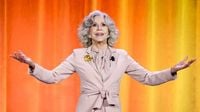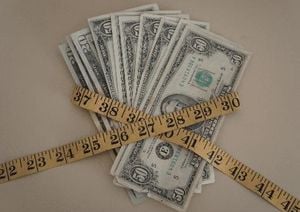Jane Fonda, the legendary actress and activist, has once again found herself at the center of a national debate. On October 2, 2025, Fonda announced the revival of the Committee for the First Amendment, a group with deep roots in Hollywood’s history and America’s ongoing struggle over free speech. With more than 550 actors, musicians, and directors—ranging from Barbra Streisand and Pedro Pascal to Billie Eilish and John Legend—joining forces, the movement has reignited urgent questions about who gets to speak, who decides what is heard, and what it truly means to defend the right to dissent in a polarized America.
The Committee for the First Amendment was originally formed in 1947 by Fonda’s father, Henry Fonda, alongside other Hollywood icons like Frank Sinatra and Lucille Ball. Their mission back then? To stand with the “Hollywood Ten,” a group of writers and directors blacklisted during the infamous House Un-American Activities Committee’s anti-Communist hearings. According to NBC News, the committee quickly became one of the most visible symbols of Hollywood’s resistance to political repression, a legacy Jane Fonda now seeks to carry forward.
“This is about the right to criticize those in power, wherever they may be,” Fonda declared in a statement echoing the committee’s founding principles. The new pledge, signed by a veritable who’s who of the entertainment world—including Aaron Sorkin, Glenn Close, J.J. Abrams, Julia Louis-Dreyfus, Julianne Moore, Kerry Washington, Larry David, Lily Tomlin, Natalie Portman, Nikki Glaser, Patti LuPone, Quinta Brunson, Rob Reiner, Rosie O’Donnell, Sean Penn, Spike Lee, Viola Davis, Wanda Sykes, Winona Ryder, Whoopi Goldberg, Michael Keaton, Ben Stiller, and many more—commits to “defend free speech and expression from this assault.”
The statement, as reported by CNN, draws a direct line from the McCarthy era to today: “The McCarthy Era ended when Americans from across the political spectrum finally came together and stood up for the principles in the Constitution against the forces of repression. Those forces have returned. And it is our turn to stand together in defense of our constitutional rights.”
The timing of the relaunch is no coincidence. It comes on the heels of a particularly fraught episode in American media: the suspension and reinstatement of “Jimmy Kimmel Live!” The show was briefly pulled from the air after host Jimmy Kimmel made remarks about conservative activist Charlie Kirk, who was assassinated, sparking a firestorm of political and regulatory pressure. According to SAN, President Donald Trump and FCC Chair Brendan Carr both pushed for the suspension. When ABC reversed course and brought Kimmel back just six days later, Trump lashed out on his Truth Social platform: “I can’t believe ABC Fake News gave Jimmy Kimmel his job back. He is yet another arm of the DNC and, to the best of my knowledge, that would be a major Illegal Campaign Contribution. I think we’re going to test ABC out on this.” Trump also referenced a past $15 million settlement with ABC over comments made by anchor George Stephanopoulos, using it as further ammunition against the network.
The White House’s response to Fonda’s initiative was swift and pointed. Press Secretary Abigail Jackson, speaking to reporters, invoked Fonda’s Vietnam War-era nickname “Hanoi Jane,” a moniker that has long shadowed her activism. “Hanoi Jane is free to share whatever bad opinions she wants,” Jackson said, reaffirming President Trump’s support for free speech and adding, “He actually knows what it’s like to be censored.” Jackson dismissed Democratic criticisms of Trump’s record as “so false, they’re laughable,” and redirected the conversation to what she called “real threats” posed by left-wing groups, whom she accused of “fueling violent riots, organizing attacks against law enforcement, coordinating illegal doxing campaigns, and inciting violence all across America.”
The revived committee hasn’t shied away from criticizing the federal government either. In its public statement, the group accused authorities of orchestrating a “coordinated campaign to silence critics”—not just in government, but also throughout media, academia, the judiciary, and the entertainment industry. “They’re betting on our fear and our silence,” Fonda wrote in a statement reported by NBC News. “But our industry—and artists around the world—have a long history of refusing to be silenced, even in the darkest times.” Fonda, now 87, described the current moment as “the most frightening moment in my life.”
While the committee’s mission is strictly nonpartisan—“open to people no matter how liberal or conservative you may be”—the political temperature around its relaunch is impossible to ignore. Lawmakers from both parties, including Bernie Sanders and Ted Cruz, weighed in on the late-night TV controversy, reflecting how the boundaries of acceptable speech are being renegotiated not just in entertainment, but across all sectors of public life. FCC Chair Brendan Carr’s pressure on broadcasters, and the subsequent investigation into corporate decisions and federal approvals, have only added to the sense that the stakes are higher than ever.
For many in Hollywood, the echoes of the past are unmistakable. The blacklists and silencing of dissenters that defined the McCarthy era now seem to be resurfacing in new guises—whether through government pressure, corporate decisions, or public outcry. The committee’s leaders believe that mobilizing artists, creatives, and public figures can generate the kind of public pressure and awareness needed to defend free speech today. While their precise strategy remains unclear, their resolve is anything but.
Yet, the debate is far from settled. The White House’s rhetoric suggests that not all expressions are seen as equally valid or dangerous, and the lines between protecting speech and policing it are as blurry as ever. As Fonda’s initiative gains traction, the committee’s nonpartisan ideals will be tested by the realities of political struggle and media cycles that thrive on division and controversy.
The relaunch of the Committee for the First Amendment is more than a nostalgic gesture; it is a rallying cry for a new generation. The right to criticize, to dissent, and to speak truth to power lies at the heart of American democracy. But as the events of the past weeks have shown, these rights remain subject to fierce contestation. Whether in Hollywood boardrooms, university lecture halls, or the halls of Congress, the question persists: Who decides what can be said, and what must remain silent?
Jane Fonda’s revival of the committee has reignited a vital conversation about the meaning and limits of free expression in America. By rallying hundreds of creative voices and drawing sharp rebuke from the White House, Fonda has spotlighted the enduring tension between dissent and authority—a tension that, if history is any guide, won’t be resolved anytime soon.




